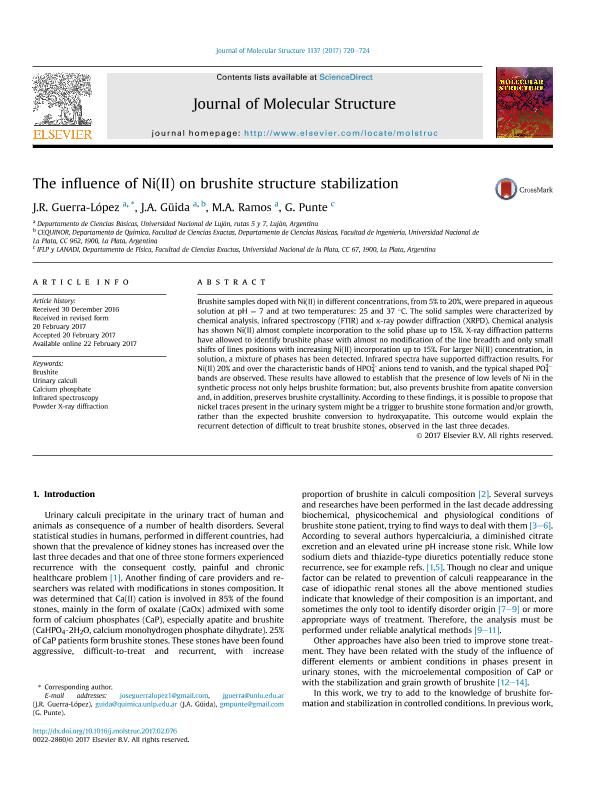Mostrar el registro sencillo del ítem
dc.contributor.author
Guerra López, José Rodolfo

dc.contributor.author
Guida, Jorge Alberto

dc.contributor.author
Ramos, Marcelo Alberto

dc.contributor.author
Punte, Graciela Maria

dc.date.available
2018-06-12T14:16:20Z
dc.date.issued
2017-06
dc.identifier.citation
Guerra López, José Rodolfo; Guida, Jorge Alberto; Ramos, Marcelo Alberto; Punte, Graciela Maria; The influence of Ni(II) on brushite structure stabilization; Elsevier Science; Journal of Molecular Structure; 1137; 6-2017; 720-724
dc.identifier.issn
0022-2860
dc.identifier.uri
http://hdl.handle.net/11336/48252
dc.description.abstract
Brushite samples doped with Ni(II) in different concentrations, from 5% to 20%, were prepared in aqueous solution at pH = 7 and at two temperatures: 25 and 37 °C. The solid samples were characterized by chemical analysis, infrared spectroscopy (FTIR) and x-ray powder diffraction (XRPD). Chemical analysis has shown Ni(II) almost complete incorporation to the solid phase up to 15%. X-ray diffraction patterns have allowed to identify brushite phase with almost no modification of the line breadth and only small shifts of lines positions with increasing Ni(II) incorporation up to 15%. For larger Ni(II) concentration, in solution, a mixture of phases has been detected. Infrared spectra have supported diffraction results. For Ni(II) 20% and over the characteristic bands of HPO4 2- anions tend to vanish, and the typical shaped PO4 3− bands are observed. These results have allowed to establish that the presence of low levels of Ni in the synthetic process not only helps brushite formation; but, also prevents brushite from apatite conversion and, in addition, preserves brushite crystallinity. According to these findings, it is possible to propose that nickel traces present in the urinary system might be a trigger to brushite stone formation and/or growth, rather than the expected brushite conversion to hydroxyapatite. This outcome would explain the recurrent detection of difficult to treat brushite stones, observed in the last three decades.
dc.format
application/pdf
dc.language.iso
eng
dc.publisher
Elsevier Science

dc.rights
info:eu-repo/semantics/openAccess
dc.rights.uri
https://creativecommons.org/licenses/by-nc-sa/2.5/ar/
dc.subject
BRUSHITE
dc.subject
CALCIUM PHOSPHATE
dc.subject
INFRARED SPECTROSCOPY
dc.subject
POWDER X-RAY DIFFRACTION
dc.subject
URINARY CALCULI
dc.subject.classification
Otras Ciencias Químicas

dc.subject.classification
Ciencias Químicas

dc.subject.classification
CIENCIAS NATURALES Y EXACTAS

dc.title
The influence of Ni(II) on brushite structure stabilization
dc.type
info:eu-repo/semantics/article
dc.type
info:ar-repo/semantics/artículo
dc.type
info:eu-repo/semantics/publishedVersion
dc.date.updated
2018-06-12T13:30:21Z
dc.journal.volume
1137
dc.journal.pagination
720-724
dc.journal.pais
Países Bajos

dc.journal.ciudad
Amsterdam
dc.description.fil
Fil: Guerra López, José Rodolfo. Universidad Nacional de Luján; Argentina
dc.description.fil
Fil: Guida, Jorge Alberto. Consejo Nacional de Investigaciones Científicas y Técnicas. Centro Científico Tecnológico Conicet - La Plata. Centro de Química Inorgánica ; Argentina. Universidad Nacional de Luján; Argentina
dc.description.fil
Fil: Ramos, Marcelo Alberto. Universidad Nacional de Luján; Argentina
dc.description.fil
Fil: Punte, Graciela Maria. Consejo Nacional de Investigaciones Científicas y Técnicas. Centro Científico Tecnológico Conicet - La Plata. Instituto de Física La Plata. Universidad Nacional de La Plata. Facultad de Ciencias Exactas. Instituto de Física La Plata; Argentina
dc.journal.title
Journal of Molecular Structure

dc.relation.alternativeid
info:eu-repo/semantics/altIdentifier/doi/https://dx.doi.org/10.1016/j.molstruc.2017.02.076
dc.relation.alternativeid
info:eu-repo/semantics/altIdentifier/url/https://www.sciencedirect.com/science/article/pii/S0022286017302351
Archivos asociados
